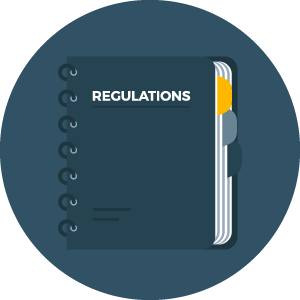Talk to Sales: (401) 200-6026
One of the best ways to protect your dealership is by establishing strong F&I training practices.
F&I training may not be every manager’s favorite topic, but with dealership compliance, the business office can’t be too careful. By training and staying up-to-date with compliance regulations, even the most experienced business managers can learn something to prevent costly errors.
It may be challenging to find time for F&I training, but the reality is that it’s an area you can’t afford to overlook. Car dealer regulations change often, and the fines for failing to follow regulations can be expensive. There’s at least one regulation for every step of the car sales process from the time the customer walks in to talk about financing up until they leave with the paperwork signed and completed. Even cash car deals need to follow the IRS Form 8300 cash reporting rule if you receive a cash payment over $10,000. A dealership caught breaking this IRS regulation faces enormous fines of up to $500,000. Factor in all the bank and registry of motor vehicle requirements, and it can be quite overwhelming.
Make it easier to avoid expensive fines by incorporating a few helpful F&I training tactics into your routine.
1. The best way to ensure compliance is to make it a daily priority.
Start your morning by reviewing notices from banks, the RMV or even extended service providers. If there are no new changes, move onto the next topic of concern. Address any issues as soon as possible before they become an even more expensive and time-consuming dilemma.
2. Build your arsenal.
Create a categorized regulation binder and update it immediately when rules change. If you prefer to go paperless, you can create a bookmark folder in your browser. It’s easier to maintain compliance when you have all the necessary guidelines at your fingertips.
3. Fake it until you make it.
Are you prepared to handle any compliance trouble that comes your way? Instead of practicing on your customers, train with your team members. Encourage constructive feedback and address any compliance concerns before they become a factor in a car buyer’s dealer review.
4. Communicate with your sales team.
Quality control should be a team effort, so don’t be afraid to share new regulations and laws with the rest of your team at your weekly meeting.
5. Become friends with your dealership’s bank representatives.
Bank reps may not always visit at the most convenient time, but they’re there to help you succeed. Address any reoccurring issues with funding delays and ask questions regarding their institution’s rules and regulations to keep you out of the danger zone. They may even have some great F&I training resources for you to explore.
6. Set aside one day a month to review any RMV or IRS changes.
Every state is different, but they all have a massive list of rules when it comes to taxing and registering vehicles. Spend a few minutes, one day a month to make sure you’re aware of any significant changes regarding vehicle tax, titles, or registration processing. Keep in mind that the most reliable place to find current information is from IRS.gov, FTC.gov, or your state’s official RMV website.
7. Utilize what your dealer association membership has to offer.
It can be extremely beneficial to set aside a few hours each month to learn something new, and dealer associations like NADA or NIADA provide helpful training resources that you can complete online.
8. Review every single car deal before it leaves your office.
Before you turn a car deal over to the office, review it for mistakes. Do you have all the documents necessary to complete the car deal? Are all your signatures in place? Do your numbers add up? A few extra minutes of quality control can prevent a lot of headaches.
9. Don’t be afraid to use a checklist.
It can be tough to adapt to a change in routine, but a checklist can help you focus on what’s necessary for funding and compliance purposes. Many financial institutions will provide dealers with a list, but you can also create your own if you find they’re missing critical guidelines.
10. Don’t wait until it’s too late to do something about compliance. Take matters into your own hands.
Analyze current sales processes regularly and immediately address concerns that could put your dealership at risk. Utilize online training resources provided by financial institutions, dealer associations and government websites. Follow F&I and auto dealer magazine newsletters. Establish a routine that incorporates F&I training into your everyday functions and it won’t be so overwhelming to stay up to date.
-
Interested in an Affordable, Full-Featured Auto Dealer CRM?
Schedule an AutoRaptor Demo Now!





